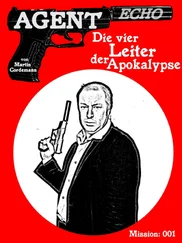I sat with my father in Frank Hadley’s office. Through the window behind him you could see the tarpaulin bulk of the boat in the rain. His yard was on an estuary, as they tended to be, a deep water channel scoured by a dredger through the silt to give the boats he worked on access to open water. In some senses everything was the same as at Bullen and Clore. There was the same pervasive salt smell and the same faint luminescence about the light, even in heavy cloud, that you only encounter on the coast. There were the briny cobbles and the great tow ropes and chains and mooring rings. And, of course, there was the presence of the Dark Echo .
But, in significant ways, everything was in complete contrast to Bullen and Clore. The spacious office was a minimalist tribute to good taste and modernity. A cappuccino machine gurgled softly in the far corner. On the wall to our left, and Hadley’s right as he faced us from behind his desk, was a bank of LCD screens. They all showed the same series of images. Computer simulations of the hull of a Norse longship appeared in complex three-dimensional patterns. The whorls and ribs of its geometry, after a few moments of viewing, could have passed for an installation of abstract art.
‘We’re building a fleet of ships for a feature film,’ Hadley explained. ‘Well, what the audience will finally see will be a fleet. We’ll in fact build only one full and exact seaworthy replica. The rest will be interiors, odd detailed sections and CGI.’
Neither my father nor I offered a comment.
‘Still damned expensive.’
Again, neither of us replied to him.
Hadley stared at the simulations for a moment. ‘We can’t better what their engineers did a thousand years ago. Not with the materials available to them, we can’t, for all our microchips and megabytes. Form and function perfectly combined, the longship. It was a staggering feat of design and execution.’
Frank Hadley wore chinos and a pale-blue cotton shirt on a tall and youthfully slender frame. His iron-grey hair was finger-combed back carelessly from a side parting. He had a sparkly look, the twinkle of a ladies’ man. In that, he wasn’t so dissimilar from my father. But his face lacked the strength of character, the firmness of jaw, the star quality, if you will, that my father’s face had always possessed in such apparent depth. In isolation he would have carried a certain male glamour. In the same room as my father, this was outshone. Comparing the two of them was like comparing Peter Lawford to Cary Grant.
My father said, ‘An unlucky vessel to a boatbuilder such as yourself is surely as the concept of a haunted house to a modern architect. It isn’t just an anachronism. It’s worse even than an absurdity. It’s an affront. An insult.’
Hadley dragged his eyes away from his bank of screens. But he would not meet my father’s gaze. He looked down at his hands, linked on the desk. ‘My thoughts on the matter are immaterial, Mr Stannard.’
‘Magnus, please,’ my father said.
‘Magnus, then. My thoughts on the subject of unlucky boats are really neither here nor there if I can’t get the men to come through the gate for their shift.’
‘Get different men.’
Hadley stood. He turned his back on us and looked out of the window at the view through the rain-bleared window, at the lowering sky and the sullen outline of my father’s prize, under its tarpaulin. ‘You were here when the fatality occurred, Magnus. You were watching the operation. I cannot find either engineer or accident investigator who can justify or explain to me why there should have been a fraction of slack in that rogue hawser.’
‘Rogue,’ my father repeated. He said the word in a neutral voice, as thought it were foreign and he was merely trying out the sound of it.
‘Yet despite the consistent and enormous tension it was under, it discovered the length and elasticity to loop around a man’s arm and severe it.’
‘Heavy engineering is dangerous work,’ my father said. ‘I understand a fund has been established at the yard for the poor fellow.’
‘It has.’
‘And I will contribute to it,’ my father said. ‘Generously.’
‘You saw his feet thrum on the deck, his dance of death in his own spreading pool of blood.’
‘It will be interesting to see how a man of your professional reputation deals with the tabloid press interpretation of this peasant witchcraft revival.’
‘Witchcraft,’ Hadley said. I think he chuckled. But I could not be sure. ‘This is not witchcraft.’
My father said nothing.
‘Did you ever think to examine the history of the boat?’ Hadley had still not turned back to face us.
‘I was familiar with the history of the Dark Echo long before I acquired the craft,’ my father said. By his standards, his self-control here was extraordinary. Anger was one of his talents. Fury was one of his most potent weapons.
‘Where is the log?’
‘In a strongbox. All five volumes of it. The log is safe and intact.’
‘It’s customary for the log to accompany the craft to which it belongs.’
‘The log is safe,’ my father repeated.
‘Then I suggest you read it,’ Hadley said.
‘I have.’
‘And I must insist that you let me read it, too.’ Finally, he turned. I had misjudged him. He was much more Martin Sheen than Peter Lawford. He did not quite possess the raw charisma on which my father so heavily traded. But he had weight and substance. He was clearly a man of principle where the well-being of his workforce was concerned. Principle was more important to Frank Hadley than tabloid credibility.
My father stood. ‘Is there anything else?’
‘The press have yet to deride me as a figure of fun. But they have not been slow to tag your acquisition an unlucky boat.’
‘Cursed, I believe, is the appellation of choice,’ my father said.
‘Well. I have received a letter from a Jack Peitersen of Newport in Rhode Island, where I know she was constructed. He has offered to come and work on the restoration. His great-grandfather worked on the original construction of the boat, he says.’ Hadley opened a desk drawer and took an airmail letter from it. I hadn’t known they still existed in the age of cyberspace. ‘He says that if we employ him to supervise the work, the restoration will be entirely successful.’
‘A crank,’ my father said, buttoning his coat, patting his pocket, I knew, for his cigar case. ‘An opportunistic blackmail attempt by some freak from New England.’
‘Except that I had him checked out,’ Hadley said. ‘He’s not a crank. Not according to his references.’
‘Then bring him over, Hadley. I’ll bankroll the exercise. But on your name and reputation be it.’ He paused. ‘I’m going outside for a smoke. Please feel free in my absence, gentlemen, to talk among yourselves.’
Frank Hadley sat back down after my father had closed the door behind him. ‘The irony is, Martin, that I greatly like and admire your dad. He is a bully and a prima donna. But as bullying prima donnas go, he’s fair-minded and generous.’
‘You never referred just now to the boat he has commissioned you to restore and refurbish by its name.’
‘No,’ he said. ‘And God help me, I never will.’
‘You really believe the vessel cursed?’
He smiled. ‘Haven’t been aboard her, have you?’
‘No.’
‘Despite our setbacks, we’ve accomplished a lot, physically. We worked hard on her for six weeks prior to the fatality. She’s sound enough for a tour. Perhaps you ought to treat yourself to one. Maybe you could get your father to act as guide.’
‘Because you won’t put a foot aboard her, will you, Mr Hadley?’
It was the second question I’d posed him that was really no question at all.
Читать дальше












